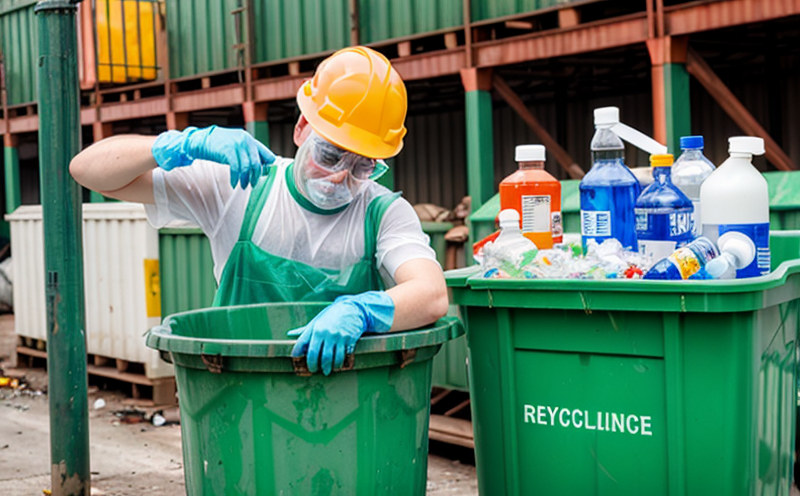ASTM D4258 Chloride Ion Testing in Recycled Materials
The ASTM D4258 standard provides a method for determining the chloride ion content of recycled materials such as asphalt shingles, roofing granules, and other waste-derived products intended for reprocessing. This testing is critical for ensuring that these materials meet environmental and safety standards before they are reintroduced into manufacturing processes.
Chloride ions can have significant impacts on various stages of the recycling process. For instance, high chloride concentrations in recycled asphalt shingles or roofing granules may lead to premature corrosion of metal components used during reprocessing. This can result in increased energy consumption and reduced product performance. Therefore, accurate measurement of chloride ion concentration is essential for optimizing quality control processes.
The ASTM D4258 method involves extracting a sample from the recycled material using distilled water or another appropriate solvent followed by analysis via potentiometric titration or other approved analytical techniques. The procedure ensures consistent results across different laboratories by specifying precise conditions including temperature, time intervals between steps, and reagent types.
Properly conducted ASTM D4258 chloride ion testing helps companies comply with regulatory requirements set forth in laws like the Resource Conservation and Recovery Act (RCRA) in the United States. It also supports sustainable practices by promoting responsible disposal of hazardous waste streams while minimizing adverse effects on natural environments.
In addition to its role in environmental protection, ASTM D4258 chloride ion testing plays a vital part in ensuring product quality throughout the entire lifecycle of recycled materials. By identifying and mitigating potential issues early on, organizations can improve their reputation among stakeholders who value eco-friendly operations and reliable products.
| Sample Material | Chloride Ion Content Range (ppm) |
|---|---|
| Recycled Asphalt Shingles | 0-500 ppm |
| Roofing Granules | 0-1000 ppm |
| Other Waste-Derived Products | Varies by type but generally less than 2000 ppm |
Note that these values are indicative and actual limits may vary depending on specific application requirements.
By adhering to ASTM D4258 standards, industries involved in waste management and recycling can enhance their operational efficiency, reduce costs associated with non-compliance penalties, and contribute positively towards global sustainability goals. The following sections will delve deeper into relevant aspects such as applied standards, industry applications, quality assurance measures, and frequently asked questions.
Applied Standards
The ASTM D4258 method for chloride ion testing is widely recognized in numerous sectors including construction materials, waste management, and environmental protection. Compliance with this standard ensures consistency in analytical results across various laboratories worldwide.
- American Society for Testing and Materials (ASTM): D4258-19 Standard Practice for Determining Chloride Ion Content of Recycled Materials
- International Organization for Standardization (ISO): ISO 6062:2017 Guidelines on Methods for Analyzing Organic Compounds in Waste Streams
- Institution of Chemical Engineers (IChemE): IPC 3400 Quality Management System for Laboratory Testing and Calibration Services
These international standards provide a framework that supports accurate testing methods, traceability, and reliability. They ensure that laboratories performing ASTM D4258 chloride ion tests maintain high levels of accuracy and precision.
Incorporating these guidelines into daily operations helps organizations meet regulatory expectations while enhancing their commitment to sustainability initiatives. It is important for users to stay updated on any revisions or updates to these standards, as they can impact how tests are conducted and interpreted.
Industry Applications
- Agricultural Waste Recycling: Ensuring that recycled agricultural waste does not contain excessive chloride ions which could harm soil quality when reintroduced into farming practices.
- Mining By-Products Utilization: Verifying that mined by-products used in construction projects do not pose risks due to elevated chloride levels affecting structural integrity over time.
- Plastic Recycling Processes: Monitoring chloride ion concentrations during plastic recycling processes to avoid contamination of final products leading to reduced shelf life or performance issues.
- Sewage Sludge Valorization: Determining the chloride content in sewage sludge that might be converted into biofuels or fertilizers, ensuring safety and efficacy post-treatment.
- Wood Waste Reuse: Checking chloride ion levels in wood waste destined for pulping operations to prevent corrosion of machinery during processing stages.
The ability to accurately measure chloride ion content according to ASTM D4258 is crucial across multiple industries where recycled materials play a significant role. Proper testing not only supports compliance with legal frameworks but also contributes significantly towards developing more sustainable industrial practices.
Quality and Reliability Assurance
Accurate chloride ion testing is vital for maintaining product quality and ensuring environmental safety throughout the recycling process. Rigorous adherence to ASTM D4258 ensures consistent results, which are essential for reliable decision-making in various stages of production.
Laboratories specializing in this type of analysis employ trained personnel equipped with state-of-the-art equipment such as potentiometric titrators and ion-selective electrodes to perform precise measurements. Regular calibration checks against certified reference materials guarantee accuracy and repeatability.
Quality assurance measures extend beyond just the testing process itself; they encompass comprehensive quality management systems that include continuous improvement initiatives, internal audits, and external peer reviews. These practices ensure ongoing compliance with relevant standards and best industry practices.
In summary, implementing robust quality and reliability assurance protocols is key to delivering accurate ASTM D4258 chloride ion test results consistently across all testing environments. This commitment to excellence fosters trust among clients and stakeholders who rely on dependable analytical outcomes.





